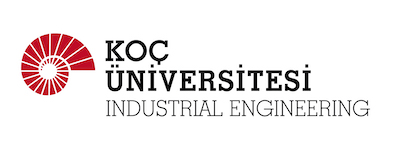Objectives and Outcomes
Industrial Engineering Program Objectives:
Graduates should be
- Recognized for excellence in technical and professional problem-solving, teamwork, communication, and leadership skills, and excel in careers in national and international companies in engineering, research and development, business and managerial positions,
- Able to perform independent research to help define the frontiers of knowledge in industrial engineering and operations management or related areas and pursue graduate study at top-ranked universities worldwide to become future national or international academic leaders,
- Innovators and entrepreneurs with a global vision, who can develop new technologies and/or products, and found new national or international companies in the production, service, finance or related sectors.
Program Learning Outcomes:
Koç Engineering graduates
- Learn advanced mathematics and natural sciences, and gain the ability to apply this knowledge towards modeling and solution of engineering problems,
- Gain the ability to identify, formulate and solve complex engineering problems,
- Gain the ability to design a component, process, system, or product to meet desired needs under realistic constraints and conditions, addressing economic, environmental, sustainability, producibility, ethical, social, political, health and security issues
- Gain the ability to select and use necessary techniques, and modern engineering and information technology tools for engineering applications and practice,
- Gain the ability to design and conduct experiments, collect data, analyze and interpret data for engineering applications,
- Gain the ability to function in intra-disciplinary and multi-disciplinary teams,
- Gain the ability to effectively communicate in Turkish and English by oral, written, and graphical means,
- Recognize the need for and ability to engage in life-long learning and to reach the most recent information in science and technology
- Recognize and understand professional and ethical responsibility,
- Understand project management, risk management, and change management concepts; as well as awareness of the importance of innovation and entrepreneurship for sustainable economic development.
- Understand impact of engineering solutions in a global and societal context, including health, environment, safety and legal issues
Industrial Engineering graduates
- Gain breadth in industrial engineering with required area courses, and provides depth in an area of specialization through 3 area elective and 6 free electives courses.
- Gain advanced mathematical foundation, including differentiation and integration, multi variable calculus, linear algebra, discrete mathematics, probability and statistics,
- Gain the ability to formulate mathematical optimization models for real-life decision problems and understand methods for solving optimization problems and utilize software for solving such problems
- Gain the ability to identify appropriate models and methods for solving decision problems; analyze and evaluate alternative or candidate solutions to decision problems
- Gain the ability to formulate analytical models and develop computer simulations to analyze systems under uncertainty
- Gain the ability to analyze and reorganize business and industrial process flows, information flows and financial flows
- Understand important concepts and designing and applying analytical models in manufacturing and service operations, including financial services
